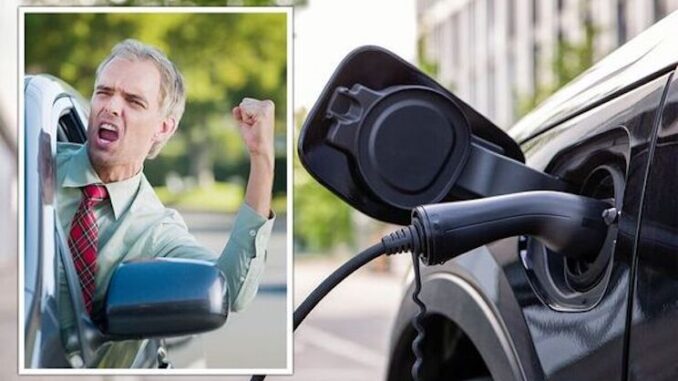
Recharging electric cars is now more expensive than filling your tank with gas, according to an official report.
Skyrocketing electricity costs has meant electric vehicle (EV) owners are no longer guaranteed a cheap driving experience. On the contrary, those who drive electric vehicles are paying more out of pocket to keep their cars running and they are also worse for the environment than petrol cars.

BYPASS THE CENSORS
Sign up to get unfiltered news delivered straight to your inbox.
You can unsubscribe any time. By subscribing you agree to our Terms of Use
Latest Video
Oil giant Shell, which oversees the majority of the charging networks in the UK, now charges 85p per kWh for its ultra-rapid chargers. BP, the country’s largest provider, charges 79p per kWh.
Dailymail.co.uk reports: For drivers of the UK’s best-selling affordable electric car, Kia e-Niro, a full recharge would cost up to £54.40, which amounts to around 23p per mile on a battery offering an average real-world range of around 230 miles.
By contrast, the best-selling petrol model last year, Ford Puma, would cost approximately £60 to refill, based on latest unleaded prices, which means with its range of around 400 miles, it is 8p cheaper per mile than the Kia e-Niro.
There are similar results when comparing petrol models and electric models from the same brand. The VW Golf 1.5L petrol car would cost around £71.85 to fill, amounting to around £13p per mile with its 550 mile range.
The VW ID 3 costs around 8p more per mile, with a cost of £49.30 for it to be fully recharged at a Shell ultra-fast point.
It has led to concern that the EV rollout required for the Government to hit its climate targets could be hampered by the cost of recharging an electric suppressing demand.
Tory MP Greg Smith, who is a member of the Commons’ Transport Committee, said: ‘The disparities in charging are absurd, not least when you factor in just how much less EV drivers are paying towards the upkeep of the roads they want to drive them on compared to petrol and diesel users contribution via fuel duty.
‘The electricity market is just not geared for EV charging, as the street vs private residence experience shows.’
To make matters worse, research by the consumer group Which? earlier this year found that the range of 70 electric cars it tested was nearly 20 per cent lower than advertised, meaning motorists could end up having to recharge more regularly than they think.
The range of EVs can also be affected by other factors, with a study by What Car? finding that the distance they can travel falls by up to a third in cold weather.
The RAC has echoed calls for the Government to address the disparity in VAT duty to help ease the financial squeeze on EV drivers who cannot charge at home.
EV spokesman Simon Williams said: ‘Despite the cost of electricity increasing dramatically due to the war in Ukraine it still only costs 10p a mile to run an EV charged at home compared to a 40mpg petrol or diesel car at 16p a mile.
‘What badly needs to happen is for the Government to cut the VAT rate on public chargers from 20 per cent to match the 5 per cent levied on domestic electricity to not only make charging away from home cheaper but to allow those who may not ever be able to do that benefit from lower cost electric driving.’
A spokesman for ChargeUK, the voice of the UK’s EV charging industry, said: ‘It’s an obvious unfairness that those without access to a driveway or off-street parking pay more tax to charge their electric vehicle than others.
‘The government should reduce the rate of VAT on public charging to 5% – the same rate applied to home energy, including EV charging.’
A spokesman for the Treasury said: ‘To drive the UK’s move to electric vehicles, we have provided over £2.5 billion to cut down purchase costs for drivers and to build the necessary infra-structure to support their usage, such as local on-street residential charging and targeted plug-in vehicle grants.’


